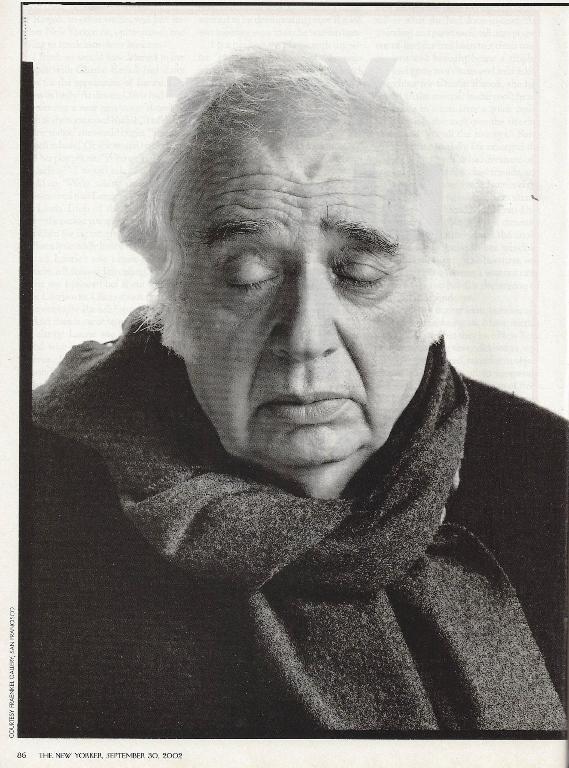
THE PROPHET
OF DECLINE

PHOTOGRAPH
BY RICHARD AVEDON
Harold
Bloom, October 28, 2001, New York City.
PROFILES
THE PROPHET
OF DECLINE
Harold
Bloom's influential anxieties.
BY LARISSA
MACFARQUHAR
Harold Bloom, nhà tiên tri
của thoái trào.
Có 1
thời,
xa xưa lắm rồi, khi Gấu chưa từng đọc Thầy Cuốc, lâu lâu… loáng thoáng
thấy, Thầy
hay nhắc đến Harold Bloom.
Giờ thì hết
rồi.
Và Gấu cứ
nghĩ Bloom là Thầy của Thầy Cuốc, như Roland Barthes vân vân và vân vân.
Đếch phải!
Tình cờ vớ
được bài này trong 1 số báo cũ, The New
Yorker, Sept 30, 2002
TV post và dịch,
nếu có thể, để trình ra 1 nhà phê bình đương thời của mũi lõ, xem có
giống những
nhà phê bình Mít mũi tẹt tí nào chăng?
Hà, hà!
THE PROPHET
OF DECLINE
It is
tempting to say that Harold Bloom is a man marooned in the wrong place
and
time, and that living out his late years in twenty-first-century
America is what's
making him miserable. It is so easy, after all, to imagine him
gleefully
roistering through taverns like his Shakespearean hero, Falstaff,
constructing
a tottering folly of puns; or denouncing Aristotelian aesthetics at
some
bacchanal in Rome (although the thought of Bloom in tights or' a toga
is
alarming). One can picture him a- feverish poet in nineteenth-century
Russia,
growing dotty and millennial like the elder Tolstoy. "He's a wandering
Jewish scholar from the first century," Sir Frank Kermode, the English
literary critic, says.
"There's
always a pack of people sitting around him to see if any bread or
fishes are
going to be handed out. And I think there is in him a lurking sense
that when
the true messiah comes he will be very like Harold." But to think this
way
is to make two mistakes. One is to suppose that mere history-a change
of
scene-can alter a spirit. That is a very un-Bloomian notion. And the
second is
to believe that miserable is a bad thing to be. Bloom, in his lyric
sadness,
his grandiloquent fatigue, and his messianic loneliness, is a great
soul.
"He did not seem happy,” a former student says. "But happiness seemed
a trivial quality compared to whatever Harold was." Bloom is not low so
much as over the top. In his misery, he is magnificent.
Bloom is a
prophet of decline. In his view, Western literature reached its apogee
in
Shakespeare, and it has been downhill ever since. Bloom loves Emerson
and
Whitman but he doesn't believe them: to him, belatedness is now a
permanent
condition of man, and there can be no overcoming it-no return, even in
America,
to an original fullness or freshness or purity of spirit. But it would
not be
right to say that Bloom is nostalgic for the past. Unlike the cultural
conservatives with whom he is often (wrongly) grouped, he does not long
for a
more genteel or simpler era. In his view, the fact that Shakespeare
lived in
sixteenth-century England does no credit to the time or the place,
because
Shakespeare's genius was sui generis-it emerged out of no-where. The
truth is,
Bloom has no interest in history as such-no interest, that is, in the
difference between one time and another-because to him all poetry that
is
valuable is timeless. Anything that time has made foreign is a period
piece,
bric-a-brac.
In fact,
it's not just historicizing that Bloom rejects-it's pastness per se. He
reads
poems as though reliving their creation. Bloom likes his poems bloody,
trailing
ruptured veins and muscles torn in struggle. It is the lyric urge and
the
strife of poetic parturition that he values, more than the poem itself
For the
epigraph of his book "Shakespeare," Bloom chose a quotation from
Nietzsche's "Twilight of the Idols" that is an extraordinary
statement to place at the beginning of a book about Shakespeare, or,
indeed,
about any sort of literature: "That for which we find words is
something
already dead in our hearts. There is always a kind of contempt in the
act of
speaking."
Bloom is a
literary critic at Yale and New York University, an authority on the
Romantic poets
and on Yeats and Wallace Stevens. He is the author of "The Anxiety of
Influence" and, more recently, of best-selling books such as "The
Western Canon," "The Book of J," and "How to Read and
Why." Next month, he publishes his twenty-eighth book, eight hundred
pages
long, titled "Genius: A Mosaic of One Hundred Exemplary Minds."
Despite these critical credentials, however, Bloom is not, for the most
part, a
close reader. He doesn't dissect stanzas, he doesn't worry words,
because he
doesn't read the way most people do. Bloom is famous for his memory and
his
reading speed. He has memorized a large proportion of canonical poetry
written
in English; once, when drunk, as an undergraduate at Cornell, he
recited Hart
Crane's long poem "The Bridge" backward, word by word. He claims that
in his youth he read a thousand pages an hour. Bloom has had poems
inside him
for so long that he doesn't really read them anymore. They are not a
series of
lines following one after the other--they exist in him all at once. He
has
swallowed them whole.
***
Bloom,
sitting, temporarily unattended, somewhere unfamiliar. He sits with his
arms
hugged around himself, head sunk, blinking miserably, in the posture of
one who
is obliged to wait in the rain without an umbrella or hope of shelter.
From
time to time, he hunches his shoulders and twists with a pained
expression, as
though trying to shift something heavy on his back.
Bloom's face
is a cluster of big, swollen, sensing instruments: a heroic nose,
nostrils
dilating; plump, colossal lips; a giant's heavy eyes, rolling or
tearing; thick,
congested eyebrows, heaving up or thrusting down; deep fissures in the
forehead.
There is no mere skin on his face-it is all membrane. Bloom is an
intensely
sensitive animal, vulnerable to the most delicate waft of emotion. His
stomach
is prodigious, like a great cathedral, in which all the uncountable
poems and
plays that he has swallowed roil and commingle with his own passions.
Bloom has
suffered heart attacks and stomach ulcers and is intermittently, and
with tepid
conviction, on a diet. But his Falstaffian fat is part of his majesty.
When
Bloom teaches, he uncoils and grows even larger. He seems to his
students not
quite in control of himself: he gets carried away, he throws himself
around, he
slips his hand inside his shirt and grasps his chest, he quivers with
feeling.
He is a superb spectacle. He worships, he adores, he falls at a poet's
feet,
but not deferentially-intimately. He
is-rabbinical, prophetic; but he is also, in his bigness and his
emotion, like
a giant mother. He is disarmingly feminine: his voice, emerging out of
the roomy
torso, is a gentle tenor. A number of his female students find the
combination
of these qualities overwhelmingly, destructively, seductive.
Some of
Bloom's students form a kind of Orphic cult about him'. They become
preoccupied
with him, and spend hours engaged in awed or prurient speculation.
Absurd
rumors circulate. It is whispered that, using his astonishing memory,
he worked
as a document courier, in the nineteen-fifties, for the Israeli
government. A
small scar on his forehead is suspected to be the mark of a bullet
wound he
suffered in Palestine in the 1948 war, He was said to be the
best-selling
romance author Harold Robbins, writing under a pseudonym.
Women
students go early to class in order to secure a seat next to him. "I
suppose
he was already on his way to Wordsworth's egotistical sublime," one
former
student says. "There was always something exciting about the way he
staged
that sense that he had some enormous thing inside him, some huge soul
or being
that's too big for this world and his body. But his teaching seemed
crushing to
me. You weren't encouraged to think on your own. He was the sow who
rolls over
and kills her young." "I really feel I am a different person for having
studied with Bloom," another student says. "He changed the scale of
my ambition: he showed me that there was a moral righteousness in
reading. He made
me feel it." "I had the
most intense castration dream of my life after one of his classes,"
says a
third, a woman. "I dreamed that I had a dotted line for cutting drawn
across my neck."
Many of
Bloom's students love him; others grow up to become feminists and
Marxists and
New Historicists, and reject everything he taught them. Bloom is
Falstaff; but
Falstaff was betrayed by only one Hal. Bloom is betrayed by thousands.
***
Every year,
Bloom is invited to Europe, to receive a prize, or to give a lecture,
or for
some other reason. Every year, he accepts, and then, every year at the
end of
the journey, he vows never to travel again. This year, on a radiant
afternoon
in late spring, Bloom boarded a ferry from Barcelona to Majorca.
Some months
previously, he had been approached by a man named Michaelangelo, a
Spanish
psychoanalyst who practices in London and is a passionate Borges
enthusiast.
With the aid of a wealthy local lady, Michaelangelo had established a
Majorcan
Borges society and had invited Bloom to speak at a society dinner.
Bloom had
accepted the invitation because he was planning to be in Spain anyway:
he had
been summoned to Barcelona to receive the Premi Internacional
Catalunya-the
Catalan equivalent, he was told, of the Nobel.
Upon his
arrival in Barcelona, Bloom had been reminded, earlier than usual, of
his
previous year's vow. He had discovered that his acceptance of the prize
obliged
him to submit to two and a half days of interviews, so that by the time
he
departed for the ferry he was utterly exhausted. In the car on the way
to the
dock, Bloom's wife, Jeanne, chatted with the driver about Snowflake,
the famous
albino gorilla who lives in the Barcelona zoo. Jeanne had read in the
newspaper
that specialists at the zoo had been breeding him over and over again
in the
(vain) hope that he would produce an albino heir, even though Snowflake
was now
quite elderly, and the constant fornication had left him visibly
depleted.
"Let us change the subject, please," Bloom entreated weakly from the
front seat. "I am beginning to identify with him."
The ferry
ride, at least, was something to look forward to. Bloom had been told
by an
American friend that travelling by boat between Barcelona and Majorca
was a
beautiful passage, the water as smooth as a sea of glass. Bloom had
been taken
with this phrase, "sea of glass," and during the dark days of
interviews
he had pictured himself sitting on a sunny deck, as peacefully and
solidly as
if he were seated on a stage while a


